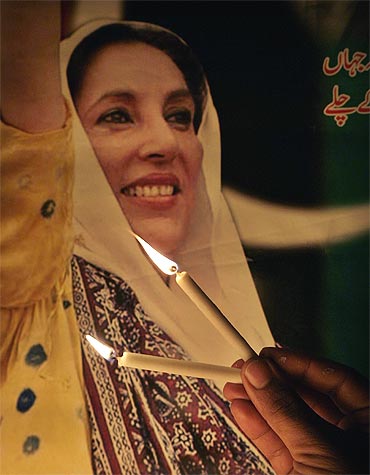
A few weeks before her murder, Bhutto sent an e-mail to newsanchor Wolf Blitzer at CNN in which she said she faced a threat to her life from then Pakistan president Pervez Musharraf.
Amir Mir, one of Pakistan's foremost investigative journalists, draws from personal anecdotes, meetings and off-the-record conversations with Bhutto to reconstruct the assassination in his book The Bhutto Murder Trail -- From Wazirstan to GHQ.
Mir tells Rediff.com's Vicky Nanjappa that it becomes clear that Musharraf was in the know of the plot and the Pakistan establishment tried to stop Bhutto from returning to the country before getting her killed when she staged a comeback.
What has the reaction to your book been?
The response is very encouraging and beyond my expectations.
However, establishment circles have reacted bitterly, especially to the inclusion of the word 'GHQ' (the Pakistan army's General Headquarters) in the title of the book.
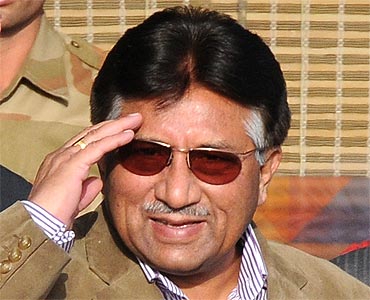
I strongly believe that Musharraf and his cronies in the Pakistani military establishment were responsible for the tragic assassination.
They first tried their best to stop her from returning home before the 2008 general election and eventually got her killed soon after she staged a comeback to take part in the election.
You must be aware of the e-mail Bhutto sent Wolf Blitzer on October 26, 2007, a few weeks before her murder, wherein she had named Musharraf as her possible assassin.
Although the United Nations inquiry commission's report into her assassination, released in April 2010, stopped short of naming Musharraf as the killer, it did go much further than anyone could have imagined in blaming him and giving broad hints about his role in the security lapses that paved the way for her assassination.
There were pages after pages in the UN report of evidence implicating men belonging to the military intelligence and the Inter Services Intelligence, for their involvement in the murder.
A long-established nexus between the Pakistani military and the militants too reinforced public suspicions on military and intelligence establishment's possible involvement in the tragedy.
Then Benazir herself told me during a one-on-one conversation on November 13, 2007, hardly a few weeks before her assassination: 'You can name Musharraf my assassin if I am killed.'
Those were the very words she had uttered twice during that meeting. Talking about the attempt on her life in Karachi on October 18, 2007, after her return from exile, Bhutto said that she knew quite well even before returning home that such a cowardly attempt would be made on her life.
'And let me tell you that the Karachi suicide bombings could not have been possible without General Musharraf's blessing,' she said.
I asked Bhutto, 'Why would Musharraf hurt you when you are already trying to negotiate a deal with him?' She smiled and said: 'I have almost made him shed his military uniform, which was like a second skin to him,' she said.
(General) Musharraf had to step down as the chief of army staff on November 28, 2007, almost two weeks after my Lahore meeting with Bhutto.
'Now that I have staged a comeback, the general is between a rock and a hard place. He is under tremendous pressure to quit the presidency, shed his military uniform, and go home. Therefore, please mind one thing, all those in the establishment who stand to lose power and influence in the post-election set-up are after me, including the general. I cannot give you any more details at the moment. You can, however, name Musharraf as my assassin if I am killed,' she had added.
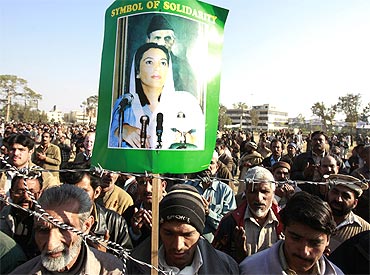
The Pakistani authorities investigating the assassination have finally charged Musharraf with abetment and conspiracy, after concluding that he had prior knowledge of the murder plot.
The challan submitted in the Rawalpindi anti-terrorism court contained 12 charges against Musharraf, stating: 'Based on motive, circumstantial evidence and statements, it is prima facie established that Musharraf is equally responsible with criminal mens rea for facilitation and abetment of assassinating Benazir Bhutto.'
The trial court issued Musharraf's non-bailable arrest warrants after his blunt refusal to appear before the court and cooperate with the investigating agencies.
The Pakistan government now intends to seek his extradition from Britain through Interpol. But the issue is complicated because there is no extradition treaty between the United Kingdom and Pakistan.
As far as the second part of your question is concerned, I doubt that the case will ever be taken to a logical end.
In fact, there are many angles to the murder that have not yet been explored by the Pakistani authorities.
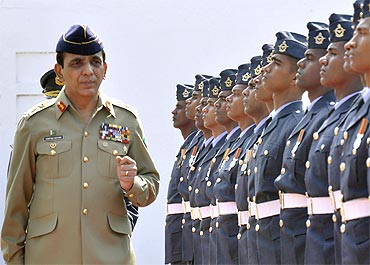
The UN inquiry commission pointed out, albeit delicately, some of these, and there is clearly a great deal still hidden from the public eye despite the installation of her own party's government in Islamabad.
First of all, neither Musharraf nor any of his three aides have so far been interrogated by the investigating agencies despite the fact that Bhutto wanted Musharraf and his aides to be named as her assassin in case of her murder.
Besides Musharraf, those Bhutto had named in a letter as her possible assassins included Brigadier (retired) Ejaz Hussain Shah (who was made the director general of Intelligence Bureau of Pakistan the day Bhutto was assassinated), Chaudhry Pervez Elahi (then chief minister of the Punjab province), and Lieutenant General (retd) Gul Hameed (a former ISI director general).
To tell the truth, army chief General Ashfaq Kayani did not allow the investigating agencies interrogate former military intelligence chief Major General Nadeem Ijaz Ahmad, who had allegedly asked the senior-most police official of Rawalpindi soon after the murder to hose down the crime scene to hinder any future probe.
In the latest development, a section of the Pakistani media has already reported that a fresh probe by the country's interior ministry uncovered the role of nine men, including an army brigadier, in the murder, and that the plot was hatched at the brigadier's official residence.
But the government was quick to refute these reports as baseless, primarily under pressure from the military establishment which is ruling the roost in Pakistan for decades now.
The three year extension granted to Kayani as the army chief is a reminder of the limits of the civilian government's authority.
Kayani, who commands the all-powerful military establishment, continues to call the shots since Musharraf's exit, and will continue to do so for the next three years.
Therefore, in his presence, the Pakistan People's Party government won't be able to proceed against either Musharraf or any of his former aides who are suspected of involvement in the Bhutto murder, especially after Kayani's extension.
Currently living in self-imposed exile in London, Musharraf is already well beyond the reach of the Pakistani authorities.
Many in government circles believe the country's top brass will not allow a potentially humiliating probe against its former army chief for his role in the Bhutto murder.
Despite Musharraf's ouster, the reality of present-day Pakistan is that the civilian government is weak and the all-powerful military is firmly in control.
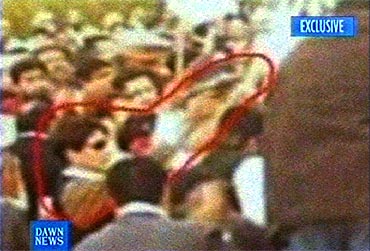
Not at all! I don't think Musharraf will ever be able to make a comeback.
He is a wasted bullet. I doubt his repeated resolve to return home to take part in the 2012 election.
Even otherwise, after having been formally charged with abetment in the Bhutto murder, I don't think Musharraf will dare to return home in the presence of the PPP government at least.
What role did Musharraf play in the assassination?
Perhaps, this is asking for too much from a journalist, especially when Bhutto's party's government is in power in Islamabad and dealing with the case.
However, the investigators have already concluded that Musharraf was well aware of the murder plot, but his regime did nothing to pre-empt it, probably because of its own involvement.
The UN commission, which was released 28 months after her assassination, had cited a major lapse in her security plan and squarely blamed Musharraf for that.
The report made it abundantly clear that Benazir had been left completely at the mercy of her killers, who took advantage of the pitiable security arrangements and assassinated her.
Preliminary investigations by the Federal Investigative Agency have established that around 125 commandos of the Punjab Police's elite force, who were supposed to provide a security box to Bhutto and escort her cavalcade to her Islamabad residence after the Liaqat Bagh rally, were moved from the rally site on the orders of then capital city police officer of Rawalpindi, Saud Aziz, who was apparently directed by the then director general of the military intelligence to do so under directions from Musharraf, thus paving the way for Bhutto's easy murder from close range.
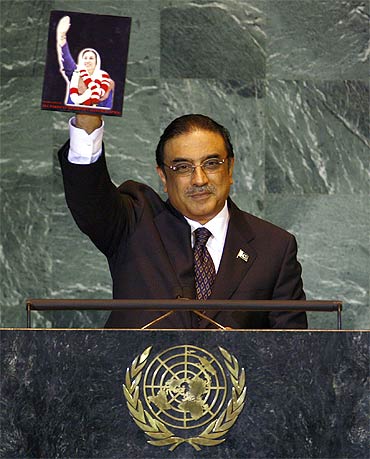
No. All the murder suspects from the police department and the civil bureaucracy have already been suspended and are facing inquiry.
If the Pakistani intelligence establishment had a role in the assassination will President Zardari bring his wife's killers to book?
I believe Zardari is the best person to answer this. But I have raised this question in my book and have also attempted to answer it.
I doubt if her killers will ever be brought to book.
According to official circles in Islamabad, the main problem is that the main murder suspect, Musharraf, was allowed to leave the country under an unannounced deal sponsored by the Americans and brokered by Kayani, under which the former dictator was given a safe passage and immunity from any type of prosecution by none other than Zardari, who succeeded Musharraf as president, and who has been struggling since then to stay in power against all odds.
I strongly believe that Pakistan's ruling PPP should try to unmask the killers while the party is in power or else the masterminds of Benazir's gruesome assassination are unlikely to be brought to justice.
In my opinion, the Pakistan government should immediately proceed against all the murder suspects at every cost, no matter how powerful they are.
President Zardari needs to understand one thing: It was Benazir's personal sacrifice that ostensibly brought the PPP into power. Therefore, the masterminds of her assassination should be taken to task before the next general election.
If her killers cannot be unmasked now, while Bhutto's PPP is in power in Islamabad, it is less likely that they will ever be unmasked.
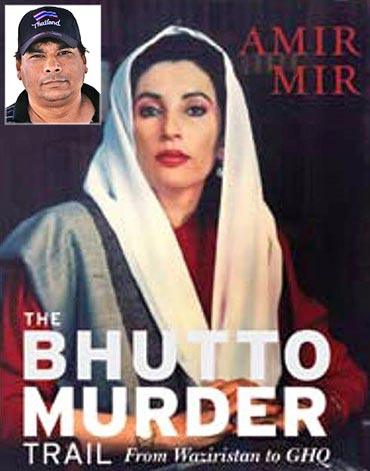
According to the UN investigation report, the name of the suicide bomber who was hired to kill Bhutto was Saeed alias Bilal, a resident of South Waziristan, who killed himself after failing to shoot down Bhutto.
How different do you think Pakistan would have been today had Bhutto been alive?
Do you think she would have become the prime minister?
I believe Pakistan would have been a liberal and progressive nation had Zulfiqar Ali Bhutto not been sent to the gallows by the country's all-powerful military establishment.
I also believe had Bhutto's daughter not been killed in December 2007 and allowed to contest the election, she would have become prime minister for the third time.
Hardly a month before her return to Pakistan in October 2007, Bhutto wrote that she prays for the best and prepares for the worst.
But in any case, she added, 'I am going home to accelerate the fight for the restoration of Pakistan's place in the community of democratic nations.'
In a September 20, 2007 article that had appeared in The Washington Post, Bhutto stated: 'I am returning home to bring change to my country.'
'Pakistan's future viability, stability and security lie in empowering its people and building political institutions. My goal is to prove that the fundamental battle for the hearts and minds of a generation can be accomplished only under democracy'.
'The central issue facing Pakistan is modernisation vs extremism. The fight against extremism requires a national effort that can flow only from legitimate elections.'
But within our intelligence and military establishment are elements who sympathies lie with religious extremists.'
'If these elements are not answerable to parliament and the elected government, the battle against religious militancy, a battle for the survival and the future of Pakistan, could be lost.'
Unfortunately, she was eliminated by these elements before she could make them answerable.
You refused to accept an award from Musharraf when he was president.
How could I have agreed to accept an award for the best investigative journalist from a dictator who had trampled upon the constitution of my country?